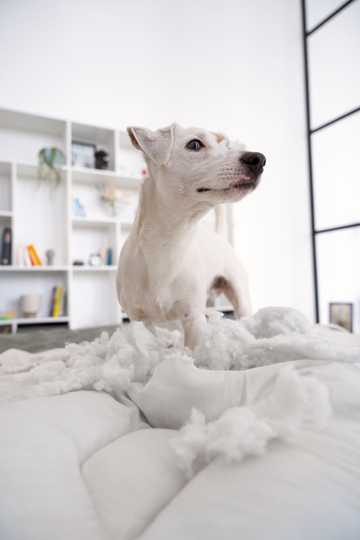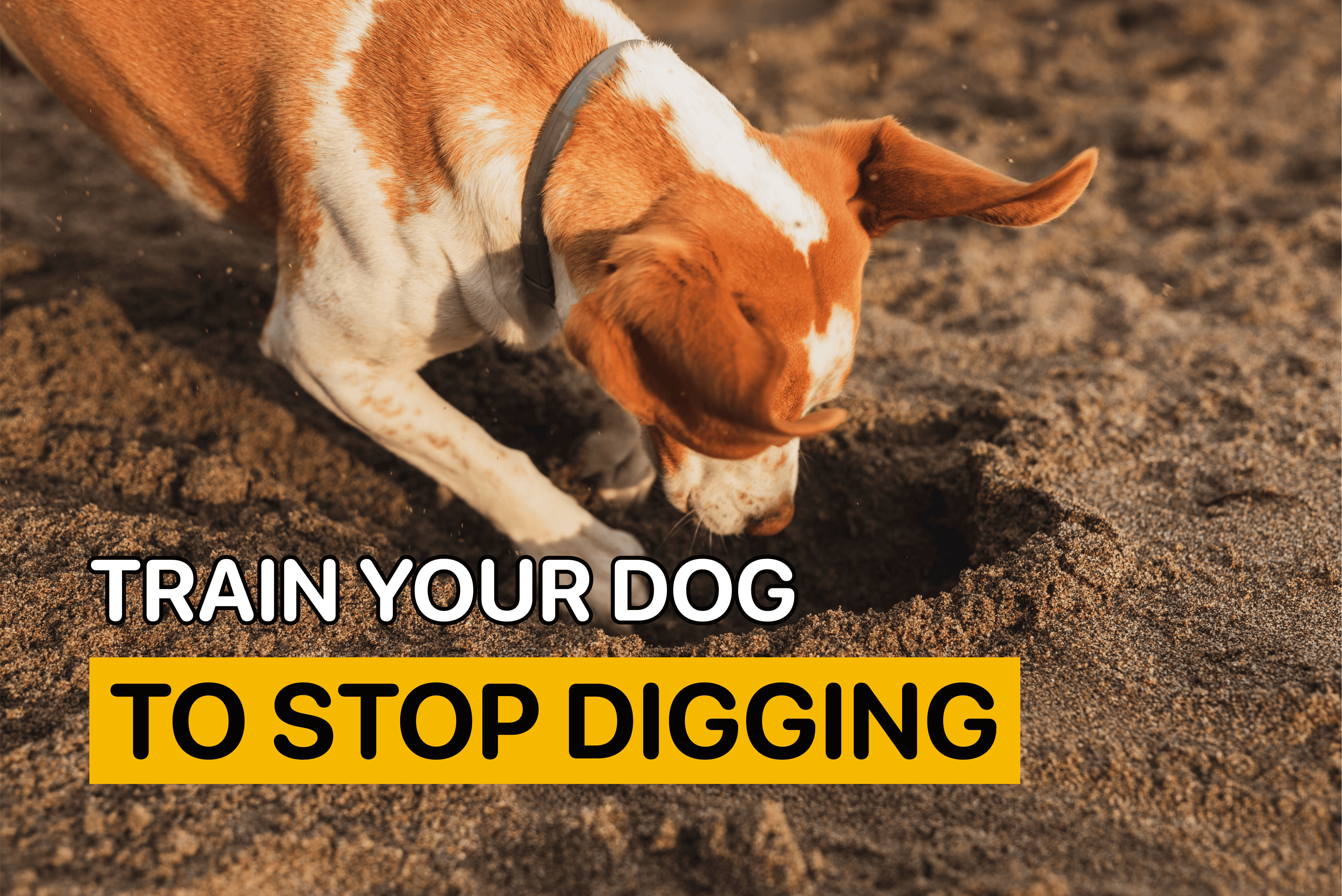Why Do Dogs Dig in Their Beds?
Have you ever caught your pup going all-out on their bed like they're trying to dig their way to China? It's a scene that's both hilarious and head-scratching. But hey, don't worry! In this article, we're diving deep into why our furry pals do this quirky digging. Plus, we'll dish out some tips on handling it if your dog gets too carried away with their adventures.
So, let's roll up our sleeves and dig into the fascinating world of canine behavior and find the answer to the question: Why do dogs scratch their beds?
Why Do Dogs Scratch Couches: The Main Reasons
Dogs dig for various reasons, like how humans have different hobbies and interests. Though circling in their bed may look entertaining, sometimes such behavior becomes compulsive and indicates deeper underlying issues.
Let's break it down:
Instinctual Bed-Digging
Scratching behavior is something modern dogs inherited from their ancestors who lived in the wild. Domestic dogs live in much safer environments but keep digging and scratching their beds as canines did centuries ago.
Dogs used to trample down the place they would lie down with their paws. This had several benefits. It made the area more comfortable, removed rocks, and scared away dangerous insects and snakes.
Now, despite living in the comfort of our houses, dogs keep digging couches to nest and arrange a cozy sleeping area.
Scratching a bed out of boredom
Imagine being stuck at home with nothing to do. You may find ways to entertain yourself. Dogs are the same. They require daily mental stimulation to avoid boredom and frustration.
If dogs left alone for too long without anything fun to do, they might start developing obsessive and compulsive behaviors. Some start pawing for attention, barking, or chewing. Others turn to digging just to pass the time.

Nesting instinct
Do you know how some people have the instinct to organize everything or build stuff? Well, for dogs, digging is in their DNA. It’s particularly prominent in pregnant dogs when their natural habitat-building mode kicks in.
It goes back to when their ancestors dug dens for shelter and raised pups. If your dog is expecting, you may notice her digging in the blankets, dragging some pillows to her sleeping area, or even stealing your laundry and bringing it to her safe spot. All these behaviors are perfectly normal for pregnant domestic dogs.
Digging to seek comfort
Dogs are intelligent about finding cozy spots. Having a safe and comfortable resting place is a must for any dog. Sometimes, digging a couch is how your dog adjusts their bedding to relax better.
Hunt and seek
Many dogs have a real knack for hunting or scavenging. They'll dig to uncover hidden treasures like rodents or buried treats. In these situations, dog scratching is like a game of hide-and-seek.
Stress release
Dogs have feelings, too, you know! When they're stressed or anxious, digging can be a way for them to let off steam. It's like a stress-relief activity for them.
Common reasons for stress and anxiety in dogs include adding a family member (a new baby or a pet), loud noises, or separation from their owner.
Attention grabber
Dogs are social creatures; sometimes, they do whatever it takes to get noticed. The dog keeps digging in bed to get you to react. Such scratching behavior is a cry for attention and quality time together.
Marking their territory
Another reason dogs scratch beds or couches is territorial marking. Scent marking plays a vital role in communication between dogs. When they scratch their sleeping area, they leave scent marks from the glands in their paws. This allows them to establish their dominance and claim the spot.
Regulating the temperature
Bed scratching is a common way dogs adjust their temperature. In hot weather, dogs may dig in the bed to create a comfortable spot to cool down. When it’s cold, some dogs try to dig deeper to find insulation layers and control their temperature.
Dog Breeds Prone to Digging in Couches
Terriers
These guys are like the Olympic champions of digging dog behavior. They have a heritage of hunting underground critters like it's their favorite game. So, if you've got a Jack Russell Terrier, Yorkshire Terrier, or a Dachshund, don't be surprised if they start digging like they're on a mission.
Huskies
Ah, the majestic Huskies! They're the adventurers of the dog world. With their boundless energy and explorer spirit, they might decide your backyard is their next Arctic expedition.

Yorkshire Terrier
Yorkies were bred to hunt rats and were used as working dogs in the past. Digging and scratching are part of their genetic makeup. However, like other dogs, Yorkies can start digging into a couch when bored or need to make a spot more comfortable.
Beagles
Beagles are like the Sherlock Holmes of dogs, always sniffing out clues. So, if they catch a whiff of something interesting buried in your yard, they won't hesitate to start digging up the evidence.
Labradors
Labs are goofballs with hearts of gold. But sometimes, all that energy and enthusiasm can lead them to a bit of mischief. If they're not kept busy, they might decide to take up gardening — by digging up your flower beds!

Dalmatians
With their boundless energy and playful personalities, Dalmatians might see your yard as their playground. If they're not entertained, they might start digging up some fun.
Is It Normal for a Dog to Dig In Their Beds?
Now that you know the most common reasons why a dog digs at a bed, you may wonder to what extent this behavior is typical. Where is the fine line between natural instincts and obsessive behavior? Bed scratching is normal, but it can damage your property. That’s why you should redirect or prevent it.
In addition, a dog scratching at beds compulsively can be a sign of distress or anxiety. If you suspect your dog is scared or anxious, you should consider consulting a veterinarian to learn more about the coping tools available.
Top Tips to Prevent Your Dog from Digging In Their Bed
Here are some tips to help prevent your dog from transforming their cozy spot into a digging pit:
Tire them out
You know how, after a long day, all you want to do is crash on the couch? Well, dogs are the same! Make sure your furry friend gets plenty of playtime and walks so they're too pooped to dig up their bed.

Get the right bed
It's like Goldilocks and the Three Bears – your dog needs a just-right bed! Make sure it's comfy and the right size for them. Ensure your dog’s comfort. If they're cozy and snug, they're less likely to feel the urge to dig around.
Distract and redirect
Don't get mad if you catch your dog or puppy scratching the bed! Instead, gently direct their attention elsewhere, like with a fun toy or a tasty treat. Positive reinforcement works wonders!
Designated digging zone
It's like giving them their little sandbox! Fill a spot in the yard with soft soil or sand so they can dig to their heart’s content. Encourage them to dig there instead of in bed, and praise them when they use their designated digging spot.
Keep it fresh
Just like you love fresh sheets on your bed, your pup appreciates a clean bed, too! Wash their bedding regularly to keep it smelling fresh and free of dirt and debris that might tempt them to dig.
Exercise their brain
Dogs love a good mental challenge! So keep them entertained with puzzle toys or games that may require thinking and stimulate the dog’s brain. These exercises are practical tools to stop digging.
Address anxiety
If your dog's digging seems to be driven by anxiety or stress, it's like tackling the root cause of the problem. Talk to your vet or a professional trainer to find ways to help your pup feel more at ease. If you’re short on time or financial resources, you can also explore courses for separation anxiety within the Woofz app.
Dog Digging in Couch: Bottom Line
So, if your furry friend is digging up your backyard or takes hours to get comfortable in their bed, it's like they're trying to tell you something. They might need more playtime, a comfy bed, or extra love and attention. So, with some patience and positive reinforcement, you'll have your pup happily snoozing in their bed without digging shenanigans in no time!



